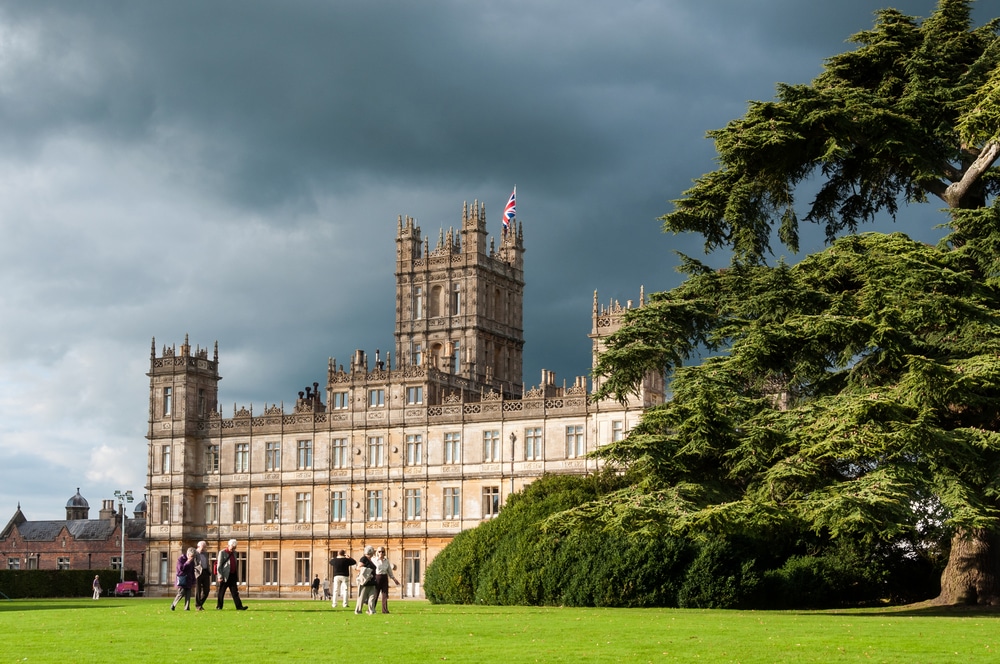If you didn’t watch the series—joining in with its phenomenal (and for some head-scratching) popularity a few years ago—Downton Abbey is a story about the estate of the Earl of Grantham and his American-born wife, the Countess of Grantham. And it’s the most watched series in PBS’s 45-year history. It’s the show that made “stuffy” PBS “cool,” at least for a little while.
Downton focuses on a British aristocrat as he tries to 1) understand an American wife with more “modern” attitudes; 2) deal with his children (and their romances and other issues); 3) oversee ‘the house,’ a gigantic manor with its vast collection of artifacts that are now part of a massive inherited estate (which includes a sizeable staff of butlers, valets, and house servants—and their romances and issues); and 4) worry about his faltering investments, which parallel the disintegrating influence of the British in the world. And of course all the characters have to deal with the shifting geo-politics of the time where the first world war will crumble the very idea of nobility. Mixed into the turn-of-the-20th-century episodes is a foundational theme—the end of an empire and the demise of a social class structure. I have a lot of company when I tell you … it’s fascinating!
All in the Family
You’re actually involved in your very own family saga. The degree you earned gives you the title of DDS, not exactly aristocratic, but it does give you an economic boost over most of your peers. And while you may not be the Duchess of Gloucester or the Earl of Grantham (accumulating riches that go beyond wild dreams) you’re still creating an estate that needs to be carefully cared for. Hopefully your life isn’t the stuff of British theater, but I’m sure you have your own dramas—parents, in-laws, spouse, kids, or even employees (and their romances and issues). With so much going on, are you really doing what you need to do to take care of your growing estate?
For most people, estate planning is intimidating. The tasks seem numerous and large … with complex legal documents … and it has to be time consuming … and it deals with your own mortality (which you don’t care to think about) … and it’s probably really expensive … and you’ll just do it later.
I know that estate planning can be confusing, but it’s not something you should wait to do. You can cut down on the complexities if you get started early—then you’ll only need to occasionally manage things as your career unfolds.
What is An Estate Anyway?
In broad terms, an estate is everything you own that you will pass down upon your death. This includes all of your assets, insurance policies, business interests, partnerships, or even some agreements you may be a part of. Good estate planning is the proactive process of making sure that each of these items can properly pass on in the case of your death or incapacitation. And remember, a life insurance death benefit might not be viewed as a financial asset when you’re alive, but upon death, those monies become part of your estate.
What is Probate and Why Avoid It?
Probate is the legal process through which your estate is properly distributed to heirs and designated beneficiaries—and by which any debt owed to creditors is paid off. If you have a will, the probate process will follow your wishes. Or, if there’s no will in place, it will follow state laws. Depending on where you live and the value of your estate, probate can be relatively quick and inexpensive, or it can be a hassle if you have a lot of stuff, especially if you have real estate, entities, or business interests in multiple states.
What is Estate Planning Then?
Estate planning is the process of ensuring that your assets pass on exactly how you want. Instead of letting state laws govern the outcomes, thorough estate planning customizes your desires and wishes. Throughout your life, as your net worth and income increase, so does the financial complexity. This creates an increasing need for estate planning. Anytime you add an asset, an account, a piece of real estate, or a contract, you should evaluate the consequence of that decision on your estate plan.
What’s the Difference Between a Will and a Living Trust?
A will and a living trust can accomplish many of the same things. Both allow you to dictate who gets your stuff when you pass away—and you can also name guardians for your kids. But a last will may be subject to the probate process. A living trust avoids the probate process if you transfer your assets (houses, cars, bank accounts, investment accounts, etc.) into it before passing. This can make the process of administering the estate much easier and more precise when the time comes. There are several different types of trusts so you’ll want to consult an attorney to make sure that you set up one that fits your level of complexity.
The Team—Financial Advisor, Attorney and CPA
If your financial advisor is keeping track of an accurate net worth statement, it can make the estate planning process much simpler for both your attorney and your CPA. There’s no need for you to dig through all of your assets and prepare a list, your net worth statement will contain most of the assets included in a comprehensive estate plan. Every few years your financial advisor can update your attorney and CPA to make the process of adjustments significantly less time consuming. Each of these individuals brings a unique perspective to the planning process and ensures that you arrive at the best outcome.
Review Your Beneficiaries, Guardians, Trustees, Executors, and Special Powers
Whether you’re using a trust, a will, or simply designating beneficiaries at the account level, you need to review the people involved in your estate planning on a regular basis. Things change … and people change. You want to make sure you keep track of these critical designations and that you’re comfortable with the decisions you made once upon a time. Perhaps most importantly, you need to make sure these people know they are named and have accepted responsibilities within your plan. Your heirs are far more likely to experience positive care if the appointed individuals are reminded of their responsibility every few years and voluntarily accept that responsibility multiple times throughout their lives.
Your Business
What happens to your practice can result in chaos for your family if you haven’t made it part of your plan. It is a huge asset and you need to determine what happens to it. I know it’s not a big thrill to talk about these things (a reason it often doesn’t get done), but make sure your wishes in regards to your practice are also established through your estate documents and operating agreement of the practice. Have a discussion with a colleague about structuring a buy-sell agreement, and put together a basic plan for a possible transition that could be valuable to both of you, your heirs, and your patients.
Conclusion—What Are You Waiting For?
As you watch the goings-on at Downton Abbey (or you roll-your-eyes and wonder what all the cultural fuss is about) consider your own estate. Take some inspiration from the Earl and Countess of Grantham and get your estate all tidied up. It’s not as large as Downton, but for you it’s every bit as serious. Cheers!




